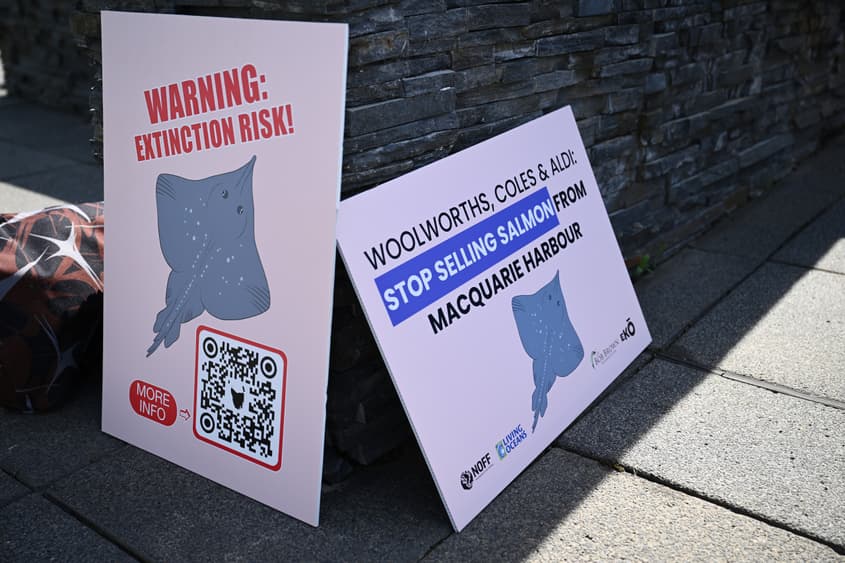After the government failed to protect the endangered species, the private sector has taken up the mantle
Tue 11 Nov 2025 10.00

Photo: AAP Image/Bianca De Marchi
At Coles Annual General Meeting (AGM) today, shareholders will consider a motion that could help save the endangered Maugean skate.
The Australia Institute has documented how salmon farming in Tasmania’s Macquarie Harbour is endangering the Maugean skate, and the harbour’s World Heritage value along with it.
Salmon farming has been associated with lower oxygen levels in the water downstream, and that’s what is threatening the extinction of the Maugean skate. Just before the federal election, Labor and the Coalition teamed up to weaken nature laws so that salmon farming could continue in Macquarie Harbour. The law that was rammed through parliament removes democratic rights to appeal government decisions and increases the likelihood that native species will become extinct.
But there is a fresh attempt to save the skate, this time through the private sector. Shareholders in Australia’s big two supermarkets have designed action to reduce the sales of salmon from Macquarie Harbour.
Shareholder activist and ethical investment group SIX has been following worldwide shareholder activism involving what it calls “nature resolutions.” These are proposals for shareholders to vote at AGMs on particular environmental issues related to a company’s business practices. SIX’s newsletter says Woolworths shareholders have just participated in the most widely supported vote for a nature resolution so far this year, anywhere in the world. The next highest was a nature resolution at the annual general meeting of the American company PepsiCo calling on it to assess and report on its vulnerability to risks associated with biodiversity loss.
Shareholders are trying to influence the way Woolies and Coles market the salmon sourced from the offending fish farms. Hence, at Woolworths’ recent annual general meeting (AGM), there were two resolutions intended to save the skate. The resolution most directly relevant said:
5(b) Farmed seafood reporting
Shareholders request that Woolworths identify and report on the impacts of farmed seafood it procures for its Own Brand products on endangered species under the Environment Protection and Biodiversity Conservation Act 1999 (EPBC Act) List of Threatened Fauna in its 2026 Sustainability Report.
Unfortunately, this was not even put to a vote because a procedural motion that would have allowed the vote was defeated. It is rare indeed for a motion to be carried if it is opposed by management. Nevertheless, we know that “proxy voters” – shareholders who did not attend the meeting but mailed in their votes – voted 34% in favour of the motion. These proxy votes made up 92% of the total vote on earlier motions at the AGM, so that if the salmon motion had been put to a vote the outcome would have been close to the 34% proxy vote.
When the same motion was put to shareholders last year it had 30% support from proxy voters, which shows that support for the motion has increased.
Neither 30% nor 34% is sufficient to change the company’s rules, but support for the proposed vote carries a powerful moral force. By comparison, a vote of 25% or more against a company’s remuneration for executives report at two consecutive meetings is sufficient to cause a spill of the board. Certainly 34% also means this vote is not just a few ratbag shareholders who can be ignored. Woolies cannot ignore this vote.
A similar resolution is being put to Coles’ AGM, which is being held today (11 November). Last year, a similar a resolution received 39% of proxy votes but the vote was not put, again for technical reasons. Coles nevertheless made some positive changes in response to the motion. It discusses the endangered Maugean skate in its sustainability report and claims it has reduced sourcing from the Macquarie Harbour. It is also reported that Coles no longer labels its own-brand Tasmanian salmon as “responsibly sourced”.
Clearly Coles could do a lot more to pressure Tasmanian fish farmers to clean up their act, and Woolies should make a start in that direction. The Coles vote on 11 November will certainly be one to watch since there is a good chance the vote will increase from 39% last year and get closer to a history-making majority.
